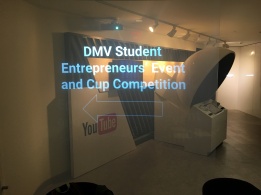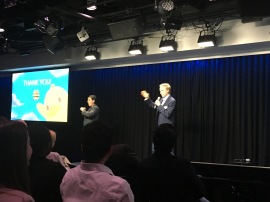We attended an amazing meetup and student pitch event on Thursday March 30 at the  Google offices in DC near Union Station — the 100 student DMV meetup. There were students from Georgetown, American University, George Washington University, Catholic University, Gallaudet University, the University of Maryland, George Mason University, Johns Hopkins University, Howard University and the University of the District of Columbia.
Google offices in DC near Union Station — the 100 student DMV meetup. There were students from Georgetown, American University, George Washington University, Catholic University, Gallaudet University, the University of Maryland, George Mason University, Johns Hopkins University, Howard University and the University of the District of Columbia.
Our colleagues at AU and GWU did the heavy lifting in organizing this meetup and pitch event, as did our hosts from the Google Policy Office.
Eight student ventures from 8 different schools pitched a range of new ventures — from a convenient,  ‘on-the-go’ makeup kit to solar energy in Africa — problems were identified, solutions offered, and market sizes assessed. There was energy and passion in the room and it highlighted how active today’s students are and how responsive our best universities are to the demands of students and the entrepreneurial economy.
‘on-the-go’ makeup kit to solar energy in Africa — problems were identified, solutions offered, and market sizes assessed. There was energy and passion in the room and it highlighted how active today’s students are and how responsive our best universities are to the demands of students and the entrepreneurial economy.
David Martell, a finance student at Mason presented his firm, SkyFarm Interactive, and his vision of a new family friendly digital world — a Disney for today and tomorrow. SkyFarm Interactive, and its main character, Duncan the Silly Duck, can be found in the iTunes sticker store!

 the target of a small, niche venture investing fund being run by
the target of a small, niche venture investing fund being run by